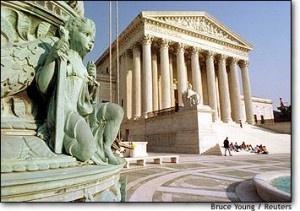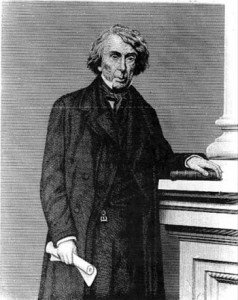No, my title today is not the name of a new rock band. Today marks the opening arguments on the constitutionality of Obamacare before the Supreme Court. Good news would be a decision declaring it unconstitutional. Bad news would be a decision upholding it. But the worst news of all is that it comes down to nine people who may determine this for the whole nation, regardless of the ruling.
 We have resigned ourselves to the idea that when the Supreme Court speaks, mere mortals must step aside. Yet the Court itself is comprised of mere mortals, not demi-gods. Some of them don’t even have any desire to inquire into the original intent or exact wording of the Constitution. A few have even suggested we look at what other nations do as our guide.
We have resigned ourselves to the idea that when the Supreme Court speaks, mere mortals must step aside. Yet the Court itself is comprised of mere mortals, not demi-gods. Some of them don’t even have any desire to inquire into the original intent or exact wording of the Constitution. A few have even suggested we look at what other nations do as our guide.
We didn’t used to have this awe over Supreme Court decisions. We used to believe we were a government made up of three co-equal branches, each of which was charged with maintaining constitutionality. When the president takes his oath of office, he says he will protect and defend the Constitution. That document gives Congress authority to remove certain types of cases from the federal purview in the courts. To my knowledge, Congress has never used that authority as leverage against unjust Court rulings.
This is what “check-and-balance” is all about.
 Back in 1857, the Supreme Court ruled on the freedom of a black slave named Dred Scott. He was from Missouri, but his master took him into Illinois and Wisconsin, where they lived for a number of years. Both areas banned slavery, so later Scott sued for his freedom, saying he shouldn’t have been held as a slave because of his residence in those places. This was seen by slaveholders as a severe threat to their “right” to their “property.” Seven of the nine justices on the Court at that time were from the South, and all sought to uphold slavery.
Back in 1857, the Supreme Court ruled on the freedom of a black slave named Dred Scott. He was from Missouri, but his master took him into Illinois and Wisconsin, where they lived for a number of years. Both areas banned slavery, so later Scott sued for his freedom, saying he shouldn’t have been held as a slave because of his residence in those places. This was seen by slaveholders as a severe threat to their “right” to their “property.” Seven of the nine justices on the Court at that time were from the South, and all sought to uphold slavery.
 The Chief Justice, Roger Taney, decided to use this case to lecture the nation on his concept of the Declaration of Independence, the supremacy of the white race, and the place of blacks in American society. In denying Scott his freedom, he said the Declaration didn’t apply to blacks and that no black person, slave or free, was to be considered a citizen of the United States. Consequently, Scott had no right even to bring the lawsuit. Further, the Congress had no authority to pass any law that limited slavery in any way throughout any state or territory in the Union.
The Chief Justice, Roger Taney, decided to use this case to lecture the nation on his concept of the Declaration of Independence, the supremacy of the white race, and the place of blacks in American society. In denying Scott his freedom, he said the Declaration didn’t apply to blacks and that no black person, slave or free, was to be considered a citizen of the United States. Consequently, Scott had no right even to bring the lawsuit. Further, the Congress had no authority to pass any law that limited slavery in any way throughout any state or territory in the Union.
This was a rather breathtaking decision. Did the entire nation bow down before the Supremes and meekly follow the “divine word”? Hardly. The new Republican party spoke out against the ruling, declaring it null and void. It had unconstitutionally denied the rights of all black persons, many of whom were free citizens who had voted in the past. It had said the Congress had no authority to pass laws about slavery when, in fact, it could pass whatever laws it saw fit for territories. The Supreme Court, dominated by a false ideology, had been wrong.
The Supreme Court today can be just as wrong. If it rules Obamacare constitutional, it will have trashed the Constitution. But that doesn’t have to be the final word. In November, we can elect enough members of Congress and a new president dedicated to repealing and replacing that dreadful healthcare bill.
Do we have the intelligence and desire to effect this change? Balance can be restored if we choose wisely. We can once again become a nation of three co-equal branches of government.
